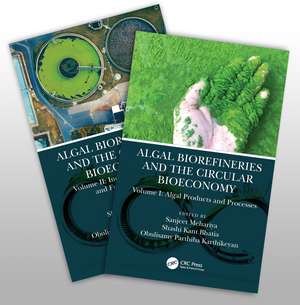Algal Biorefineries and the Circular Bioeconomy
Editat de Sanjeet Mehariya, Shashi Kant Bhatia, Obulisamy Parthiba Karthikeyanen Limba Engleză Hardback – 13 apr 2022
| Toate formatele și edițiile | Preț | Express |
|---|---|---|
| Paperback (2) | 440.61 lei 6-8 săpt. | |
| CRC Press – 14 oct 2024 | 440.61 lei 6-8 săpt. | |
| CRC Press – 14 oct 2024 | 522.24 lei 6-8 săpt. | |
| Hardback (2) | 1074.83 lei 6-8 săpt. | |
| CRC Press – 13 apr 2022 | 1074.83 lei 6-8 săpt. | |
| CRC Press – 13 apr 2022 | 1805.81 lei 6-8 săpt. |
Preț: 1805.81 lei
Preț vechi: 1984.41 lei
-9% Nou
Puncte Express: 2709
Preț estimativ în valută:
345.65€ • 375.58$ • 290.53£
345.65€ • 375.58$ • 290.53£
Carte tipărită la comandă
Livrare economică 21 aprilie-05 mai
Preluare comenzi: 021 569.72.76
Specificații
ISBN-13: 9781032033860
ISBN-10: 103203386X
Pagini: 838
Dimensiuni: 156 x 234 x 114 mm
Greutate: 1.87 kg
Ediția:1
Editura: CRC Press
Colecția CRC Press
ISBN-10: 103203386X
Pagini: 838
Dimensiuni: 156 x 234 x 114 mm
Greutate: 1.87 kg
Ediția:1
Editura: CRC Press
Colecția CRC Press
Public țintă
AcademicNotă biografică
Obulisamy Parthiba Karthikeyan (OPK) is currently working as a research assistant professor at University of Houston, Texas, USA.
Sanjeet Mehariya, PhD, is working as a Postdoctoral Researcher at Department of Chemical Engineering, Materials, Environment, Sapienza - University of Rome, Italy to produce nutraceuticals from oleaginous microalgae.
Shashi Kant Bhatia is working as an Associate Professor in Department of Biological Engineering, Konkuk University, Seoul, South Korea.
Sanjeet Mehariya, PhD, is working as a Postdoctoral Researcher at Department of Chemical Engineering, Materials, Environment, Sapienza - University of Rome, Italy to produce nutraceuticals from oleaginous microalgae.
Shashi Kant Bhatia is working as an Associate Professor in Department of Biological Engineering, Konkuk University, Seoul, South Korea.
Cuprins
Volume 1: Algal Biorefineries and the Circular Bioeconomy: Algal Products and Processes 1. Marine Macroalgal Biorefinery: Recent Developments and Future Perspectives 2. Valorization of Algal Spent Biomass into Valuable Biochemicals and Energy Resource. 3. Algal Role in Microbial Fuel Cells 4. Potential of Microalgae for Protein Production 5. Microalgae for Pigments and Cosmetics 6. Microalgae for Animal and Fish Feed 7. Algal-Sourced Biostimulants and Biofertilizer for Sustainable Agriculture and Soil Enrichment: Algae for Fertilizers and Soil Conditioners 8. Recent Trends in Microalgal Refinery for Sustainable Biopolymer Production 9. Algae as a Source of Polysaccharides and Potential Applications 10. Algae as Food and Nutraceuticals 11. Cyanobacterial Phycobiliproteins – Biochemical Strategies to Improve the Production and Its Bio Application Volume 2: Algal Biorefineries and the Circular Bioeconomy: Industrial Applications and Future Prospects 1. Genetic Engineering in Improving the Output of Algal Biorefinery 2. Recent Development in Microalgal Cultivation and Biomass Harvesting Methods 3. Application of Microalgae for CO2 Mitigation and Sequestration of Flue Gas 4. Microalgae-Based Nutrient Recovery from Urban Wastewater 5. Microalgal Metal Remediation from Industrial Wastewater 6. Application of Microalgae for Removal of Pharmaceuticals from Aqueous Matrices 7. C1-Proteins Prospect for Production of Industrial Proteins and Protein-Based Materials from Methane 8. Microalgal Consortia and Their Biotechnological Applications 9. Algae from Extremophilic Conditions and Their Potential Applications 10. LCA: A Tool to Develop Sustainable Microalgal Biorefineries 11. Commercial Operation of Algal Technology: A Case Study and Techno-Economic Analysis
Descriere
This book offers complete coverage of microalgae refineries, including biology, production techniques, biotechnological applications, economic perspectives of applications, and environmental effects of microalgae cultivation. It also summarizes the strategies and future perspectives of microalgal refineries with circular bioeconomy concepts.
